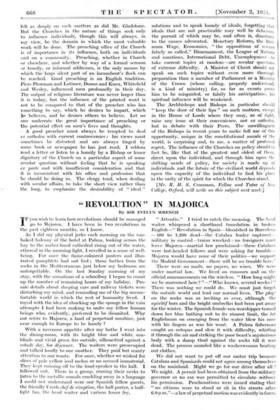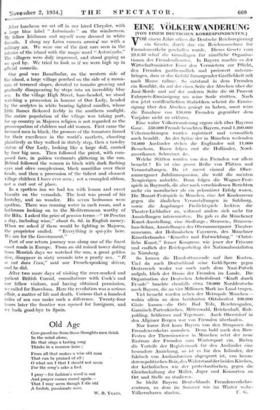REVOLUTION" IN MAJORCA
By SIR EVELYN WRENCH
IF you wish to learn how revolutions should be managed go to Majorca. I have been in two revolutions in the past eighteen months, so I know.
As I did my physical jerks each morning on the sun- baked 'balcony of the hotel at Palma, looking across the bay to the amber-hued cathedral rising out of the water, ethereal in the morning light, I revelled in a sense of well- being. For once the flame-coloured posters and illus- trated pamphlets had not lied ; those bathes from the rocks in the Mediterranean just below my bedroom are unforgettable. On the last Sunday morning of my stay, with the sensations of a schoolboy I began to count up the number of remaining hours of my holiday. Pro saic details about sleeping cars and railway tickets were disturbing my mind, and reminding me of the big uncom- fortable world in which the rest of humanity lived. I toyed with the idea of chucking up the sponge in the vain attempts I had been making to unite my fellow human beings who, evidently, preferred to be disunited. Why not retire to Majorca, a land of perpetual sunshine, just near enough to Europe to be handy ?
With a ravenous appetite after my bathe I went into the dining-room, with its bright blue and white sun- blinds and vivid green firs outside, silhouetted against a cobalt sky, for dejeuner. The waiters were preoccupied and talked loudly to one another. They paid but scanty attention to our wants. For once, whether we wished for slices of pale yellow iced melon or no seemed immaterial. They kept running off to the loud-speaker in the hall. I followed suit. There in a group, craning their necks to listen to the metallic sounds crackling away in a language I could not understand were our Spanish fellow guests, the friendly Czech chef de reception, the hall porter, a bull- fight fan, the head waiter and various lesser fry, " Attentio." I tried to catch the meaning. The head waiter - whispered a shorthand translation in broken English—"-Revolution in Spain—bloodshed- in- Barcelona —400 to 1,200 dead—the Catalan leader captured— military in control—trains wrecked—no foreigners nuist leave Majorca—martial law proclaimed—these Catalans were hot-headed fellows and were asking for trouble— Majorca would have none of their politics we support the Madrid Government—there will be no trouble here."
There were no mails, no papers, no wires. We were under martial law. We lived on rumours and. on the official announcements on the wireless. " How long might we be marooned here ? "—" Who knows, several weeks ? There was nothing we could do. We must just forget the outside world and lead our normal lives: The plage on the rocks was as inviting as ever, although the aperitif bars and the bright umbrellas had been put,away for the winter. The Spanish female sun-worshipper turned down her blue bathing suit to its utmost limit, the fat Englishman on emerging from the- water blew his nose with his fingers as was his wont. A Palma fisherman caught an octopus and slew it with difficulty, whirling it through the air and striking the poor beast's mysterious body with a damp thud against the rocks till it .was dead. The process sounded like a washerwoman beating out clothes.
• We did not want to put off our motor trip because Catalans and Spaniards could not agree among themselves on the mainland. Might we go for our drive after all ? We might. A permit had been obtained from the military governor as no car was permitted to circulate without his permission. Proclamations were issued stating that " no citizens were to stand or sit in the streets after 6.0 p.m:"—,a law of perpetual motion was evidently in force. After luncheon we set off in our hired Chrysler, with large blue label " Autorizado " on the windscreen. My fellow Irishman and myself were dressed in white flannels. I slung my Leiea camera arouril me with a military air. We were one of the first cars seen in the interior of the island with the magic word " Autorizado." The villagers were duly impressed, and stood gaping as we sped by. We tried to look as if we were high up in official councils.
Our goal was Banalbafur, on the western side of the island, a large village perched on the side of a moun- tain of terraced slopes, devoted to tomato growing and gradually disappearing by steps into an incredibly blue sea. In the village High Street, bare-headed, we stood watching a procession in honour of Our Lady, headed by the acolytes in white bearing lighted candles, whose little flames flickered feebly in the southern sunlight. The entire population of the village was taking part, for up country in Majorca religion is not regarded as the preoccupation of children and old women. First came the bronzed men in black, the growers of the tomatoes famed for their excellence in the world's markets, chanting plaintively as they walked in stately step, then a tawdry statue of Our Lady, looking like a large doll, carried by four big men. Then followed the priest, with com- posed face, in golden vestments glittering in the sun. Behind followed the women in black with dark flashing eyes and olive complexions, black mantillas over their heads, and then a procession of the tidiest and cleanest village children I have ever seen ; not a crumpled ribbon, not a curl out of place.
In a spotless inn we had tea with lemon and sweet biscuits on the verandah. The host was proud of his hostelry, and no wonder. His seven bedrooms were spotless. There was running water in each room, and a bathroom looking on to the Mediterranean worthy of the Ritz. I asked the price of pension terms—" 10 Pesetas a day, including wine," about as. ad. in English money. When we asked if there would be fighting in Majorca, the proprietor smiled. "Everything is qui-yite here. We are for the Government."
Part of our return journey was along one of the finest coast roads in Europe. From an old ruined tower dating from Moorish days we watched the sun, a great golden disc, disappear in sixty seconds into a pearly sea. " // se met dans l'eau," said our French-speaking driver, and he did.
After two more days of visiting the over-worked and patient British Consul, consultations with Cook's and our fellow visitors, and having obtained permission, we sailed for Barcelona. Here the revolution was a serious affair, a matter of life and death. Curious that a hundred miles of sea can make such a difference. Twenty-four hours later the frontier was opened for foreigners, and we bade good-bye to Spain.















































 Previous page
Previous page